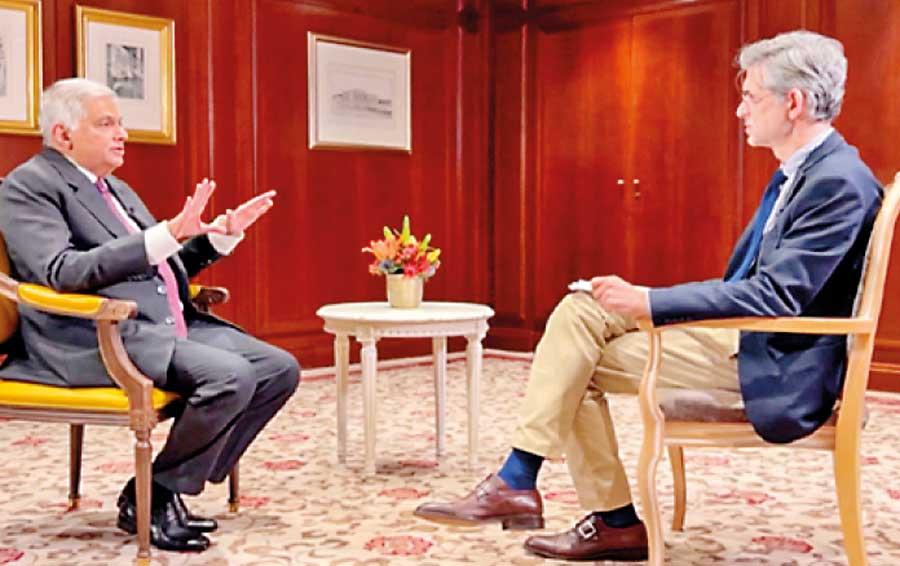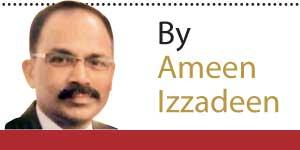06 Oct 2023 - {{hitsCtrl.values.hits}}

Deutsche Welle’s Martin Gak interviewing President Ranil Wickremesinghe
In President Ranil Wickremesinghe’s verbal blitzkrieg during his October 4 interview with Germany’s public broadcaster, Deutsche Welle, slamming the Western media’s prejudice against the global south, there are many takeaways. They relate to politics and media studies, among many other subjects that include public diplomacy and double standards in international relations.
prejudice against the global south, there are many takeaways. They relate to politics and media studies, among many other subjects that include public diplomacy and double standards in international relations.
First, the political aspect. The video clip that is now going viral is the first clear indication that President Wickremesinghe is all set to contest the 2024 presidential election in alliance with the Sri Lanka Podujana Peramuna (SLPP).
Many analysts believe that the president’s aggressive stand during the interview is largely for domestic consumption, a political exercise aimed at building his image as a leader who would not compromise the country’s sovereignty, even if it meant standing up to powerful Western powers. This is the stuff SLPP candidates are made of. The SLPP has learned that by arousing ultranationalist fervour in the Sinhala Buddhist voter, elections can be won.
Why did the President react so strongly to Gak’s question on the international probe citing Channel 4’s programme, unless he was trying to appeal to the SLPP vote bank? After all, the victims, the Catholic Church, opposition political parties, and others have called for an international probe. Furthermore, last year, the President himself stated that Britain’s Scotland Yard would be asked to investigate the attacks. Also in 2015, the so-called Yahapalana government, of which he was the prime minister, co-sponsored the United Nations Human Rights Council resolution 30/1, which, among other matters, insists on international cooperation in an independent domestic probe into alleged war crimes committed during Sri Lanka’s separatist war.
If the President were to align with the hardline SLPP for the presidential election, then his opponent would be all but guaranteed a victory at the start of the race.
Psephological studies show that winning the trust of religious and ethnic minorities is crucial for a presidential victory, particularly when the Sinhala Buddhist vote is split. In 2019, Gotabaya Rajapaksa won the presidential election largely because an overwhelming percentage of the Sinhala Buddhists believed that he would ensure national security and eliminate Islamic extremism that was responsible for the Easter Sunday terror attacks. The incumbent president is not unaware of this election arithmetic and the new realities after last year’s Aragalaya uprising.
Apart from the presidential election takeaway, the viral video clip in which the President is heard furiously accusing Deutsche Welle’s star journalist Martin Gak of talking nonsense and having a mindset that makes him think the people in the global south are second-class citizens also offers lessons in journalism, especially on how to conduct interviews.
In journalism classes, we are taught that there are many risks associated with an interview. So, we are advised to be prepared to face situations where the interviewees decide, for instance, that they do not like our looks and therefore will tell us only unimportant and even untrue things.
Journalists are told they need to be neutral. But, there is something called personal chemistry between the interviewer and the interviewee. Some interviewees would like us at first sight; others will be suspicious of us from the beginning. Once, during an interview, a senior politician accused me of having an ulterior motive and told me to leave his office. It took me at least an hour to convince him that the question that triggered him was spontaneous and not asked with an ulterior motive.
Another risk that we are warned of is a situation where the interviewee is in a bad mood, probably after a fight with the spouse, and decides to give you a hard time. We journalists are told not to get trapped in such a situation. We are told an interview is not a box to get stuck in. It is a challenge where the journalist has to be active, not passive. The interviewer should be in control and should therefore be prepared to take action to manage a difficult situation.
To prepare for tough interviews, we are told to do our research or homework ahead of the interview, not only about the subject matter of the questions to be asked but also about the man or woman we are going to interview. We are told to do some detective work to know the likes and dislikes of the interviewee. If the interviewee is a golf fanatic, we are told to study a little bit of golf and talk about golf with him before the interview starts. If the interviewee is recovering from a shocking event or a tragedy, we are told to be more of a listener than an asker.
Being a seasoned and respected journalist, Martin Gak should be aware of these risks in interviews, and he very well shifted gears to stay in control of the interview even as he came under fire from the Sri Lankan President. Gak has covered Sri Lanka for ten years. His stories include the Easter Sunday bombings, the COVID pandemic in Sri Lanka, and the ongoing economic crisis. We would like to see how the President would react if Stephen Sackur of the BBC’s Hard Talk fame were to interview him.
The political flavour in the presidential outburst apart, the president was, in a way, right to call out the West’s colonial mindset and the double standards of the Western media. However, it would be more appropriate if had done so in a more refined and dignified manner. But slamming the West was not his intention. If it was so, he could have made use of the Berlin Dialogue Forum, where he made the opening remarks. It is also unlikely that he would ever tell the International Monetary Fund not to treat Sri Lankans as second-class citizens.
During interviews with the media, leaders are expected to be respectful of journalists whose nature is to fire tough questions in anticipation of headline-hitting answers. The president cannot expect Martin Gak who has been moulded in Germany’s free media culture to bowl him full tosses.
World leaders, including those whom the West labels as dictators, have been asked more provocative questions than what was put to President Wickremesinghe. They had reacted calmly and handled the interviewers with much decorum. President Bashar al-Assad of Syria, for instance, was asked by the BBC’s Jeromy Bowen why he was killing civilians who were demonstrating. Assad did not lose his temper. He was in full control of the interview and appeared cool and composed but forceful in his replies.
Kenya’s President William Ruto is another example to follow. Emerging as a pan-African leader, he is known for his exceptional ability to handle Western journalists, often leaving them speechless with his thought-provoking answers, which are full of substance. Sadly Sri Lanka’s erudite president lost his cool and was unmindful that demeanour is part of public diplomacy, an important tool for promoting national interests and building relationships with other countries.
27 Dec 2024 30 minute ago
27 Dec 2024 1 hours ago
27 Dec 2024 2 hours ago
27 Dec 2024 2 hours ago
27 Dec 2024 2 hours ago